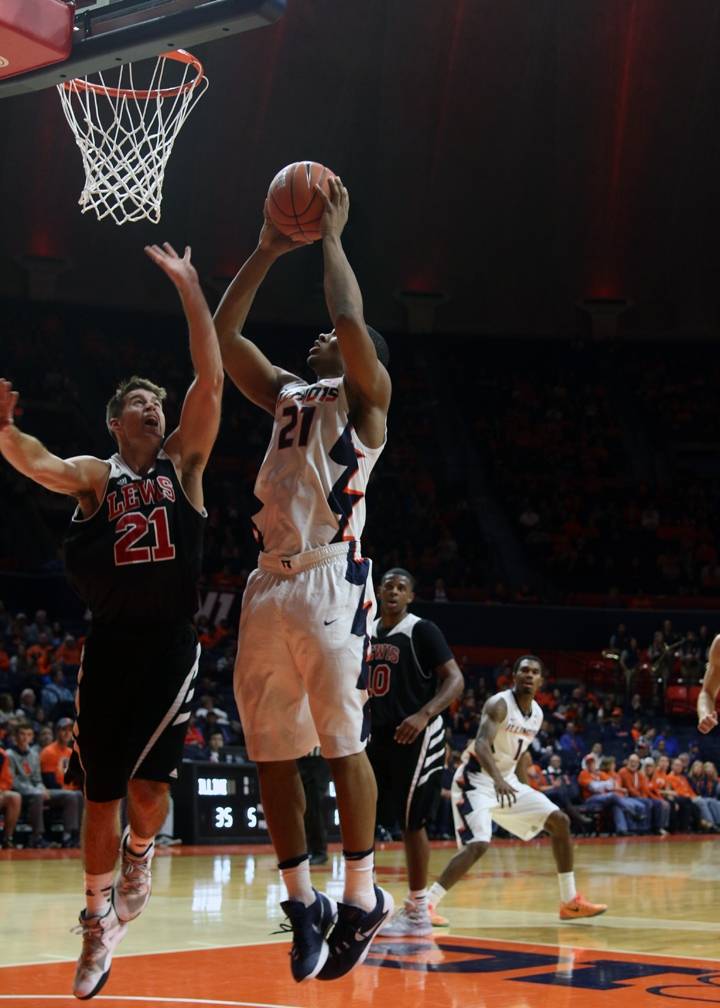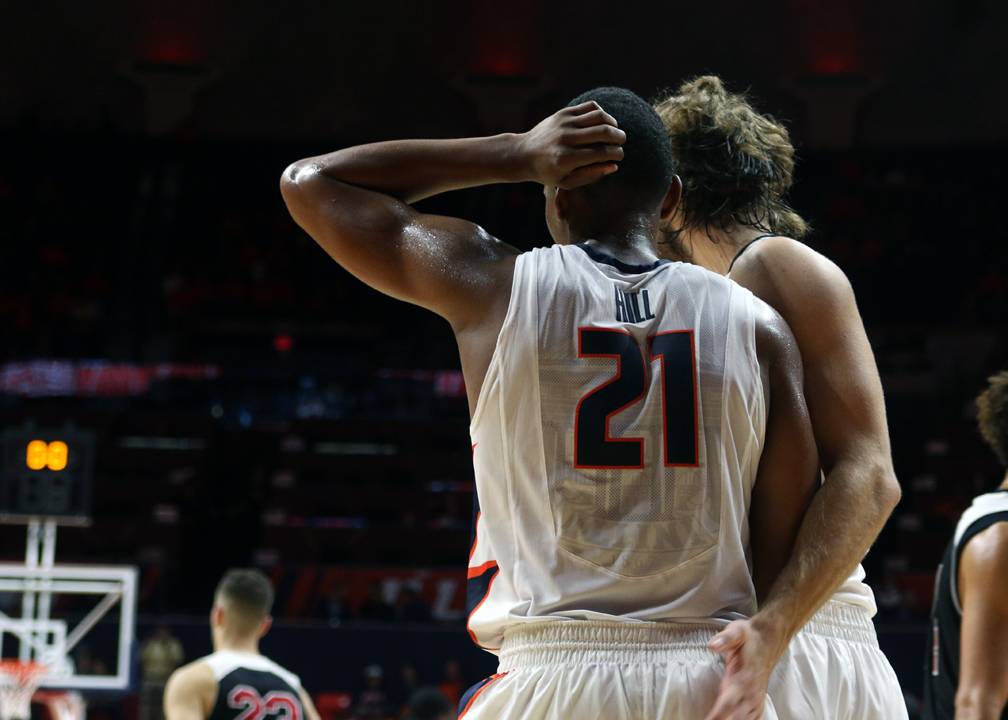Adam Fletcher cuts a dour, yet dapper figure on the Illinois basketball sidelines. Listed at 6’9” and 241 pounds as senior (2008-09) in his Miami (Ohio) basketball bio, it’s not hard to imagine he’s added a few pounds of muscle weight to that imposing frame in the years since. When he erupts in celebration on the bench or nearly pulls down the rim with a pregame dunk, he looks like he might Hulk right out of his clothes at any minute, which only adds to his intimidating aura.
Intimidation, however, does not appear to be a part of his skill set as a coach. Rather, Fletcher is a man of action, and, in improving the strength and conditioning of the Illini, his results speak for themselves. And his pupils have no problem speaking for them as well:
Tracy Abrams: I’m stronger, I think I’m faster, I can jump higher.
Kipper Nichols: Fletcher has not only changed my body, but my game.
Malcolm Hill: All around, with all of us, numbers don’t lie…me personally, he’s helped my athleticism and my ability to finish in the paint.
Jaylon Tate: I feel bigger, stronger, and since I’ve gotten bigger I’ve still kept my speed, and that’s the main thing.
Michael Finke: From day one he’s been committed to us.
DJ Williams: Fletcher works our shoulders down to our ankles, he works everything so we can improve and do better.
Fletcher raised a lot of eyebrows this summer with a series of tweets detailing the gains the men’s basketball team had achieved while working with him. The stats themselves were intriguing, such as adding 121 pounds to Malcolm Hill’s squat or improving Aaron Jordan’s vertical by seven inches, but it was the images attached to those stats that were truly eye-popping. The before-after images seemed like those from an infomercial, but Fletcher backed them up with ample video evidence. The simple physical impression cut by the players further demonstrated that there is no smoke and mirrors to the gains the Illini have made.
The weight room is obviously an important factor in the transformation of the team, but Fletcher’s coaching goes well beyond. What the strength and conditioning coach has done is change the players’ lives in order to change their bodies.
“It’s an individualized program, each guy has his own set of goals based on what myself and the coaches talk about,” Fletcher said of his methods. “The way we achieve it is a lot of nutrition: I eat with the guys every day and make sure they’re doing the right thing nutritionally. Then we’re in the weight room four days a week. We put a lot of time in this offseason and guys really bought into what the program was and the results speak for themselves.”
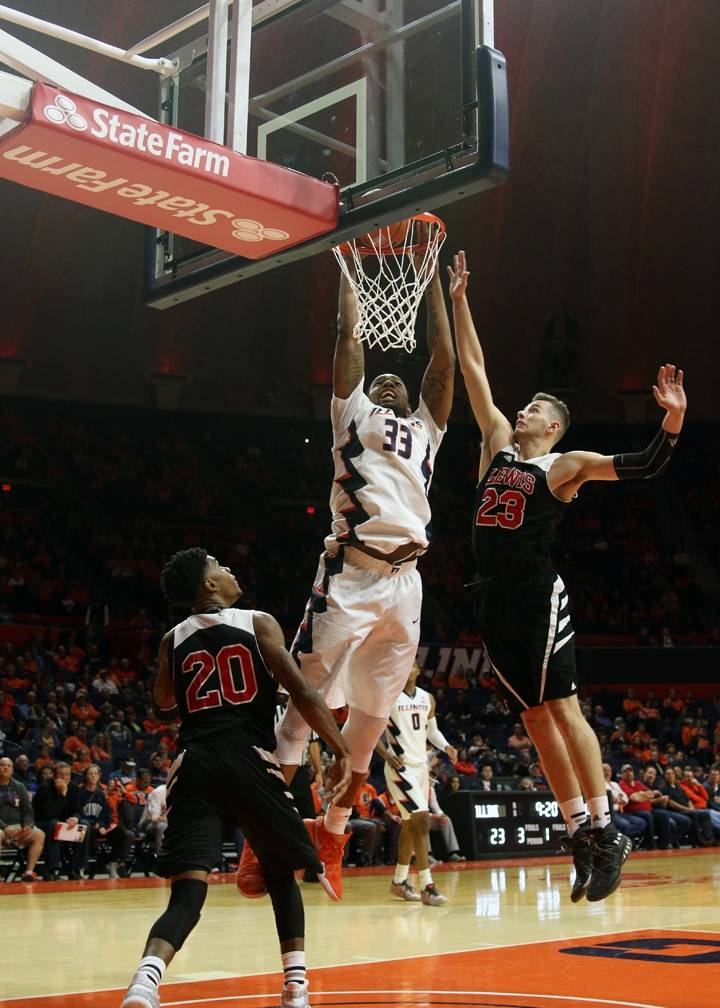
The results, though, are not simply about numbers or a healthy lifestyle. What Fletcher and the Illinois staff are doing, is building a better basketball player by design. With his background as a player and expertise as a strength coach, he’s tailored his methods to emphasize one thing: basketball ability.
“Training specificity is the number one thing. Everything we do we do with a basketball approach to make sure we’re building better basketball players, not just a better weight lifter or body builder…we want to make basketball-specific athletes,” Fletcher said.
To a man, the Illini sung the praises of their strength coach, and that includes coaches.
Head coach John Groce praised the team effort, calling it “more change in a 6-month span than I’ve seen as a coach, including as an assistant.”
In season previews, many experts seem to be unsure where to place this Illinois team this year. For instance, USA Today’s Big Ten preview has the Illini finishing 12th, whereas Big Ten Network’s Tom Deinhart has them finishing sixth. However, it is unclear how closely any national writers have been paying attention, if at all, to Illinois’s gains in the weight room. From the inside, though, players have a belief that their work will pay dividends.
“You can get stronger and more conditioned, but some people don’t use it on the court. With how we worked out this past summer, it was more showing ourselves that we are capable of being stronger and better conditioned, and that ultimately helps our mentality. I think that’s the best part he’s instilled in us, not only strengthening ourselves physically but mentally,” Jalen Coleman-Lands said.
From the seniors down to true freshman Te’Jon Lucas (who said he has already improved his bench press from 165 to 225), the Illini are feeling stronger and more ready to compete than ever. If their gains in the weight room turn into gains on the floor, this could be a very good year for the Orange and Blue.
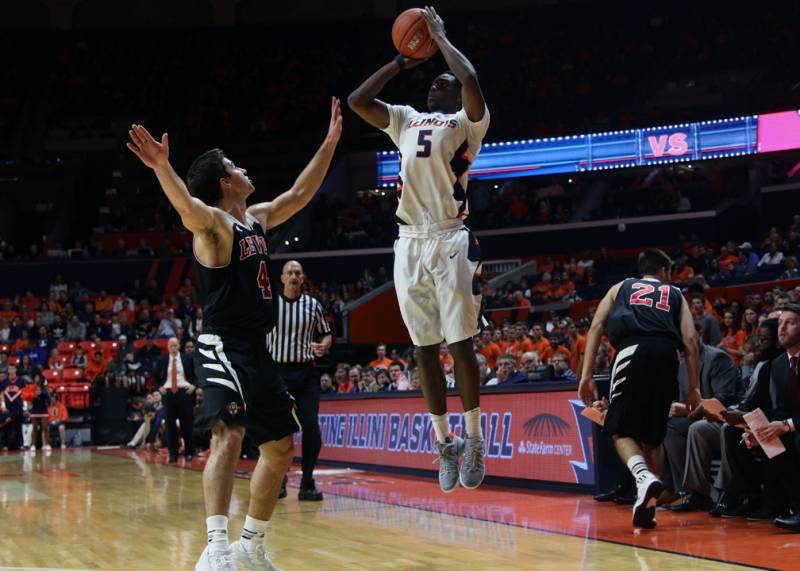
2016-17 Illinois Fighting Illini
The Man
Malcolm Hill, guard, senior
You know Malcolm. He was just about all the Illini had last season in terms of production. He started all 34 games, averaged 35 minutes, and put up 18 points per game. Last season was a disappointment for the team, to be sure, but without Hill it would have been an utter disaster.
Hill is a natural wing, at his best when he can challenge defenders without orchestrating the entire offense. When injuries robbed the Illini of a top-class point guard, however, Hill stepped up and ran the whole damn thing better than anyone else in uniform. Likewise, when Illinois’s big men were lost for the season, Hill moved his game to the paint and did a commendable job cleaning up down low despite being smaller than some opponents. This year, God-willing, Hill will get a chance to shine in his natural position, and the result could be contending for Big Ten Player of the Year.
Last year, Hill was among the best in the conference for scoring (3rd), rebounding (9th), free throw percentage (8th), assists (13th), steals (12th), defensive rebounds (5th), and minutes played (5th). None of that matters to him, though, and that’s why fans have to love him: Team will always come before personal accolades. He’s already seen some double-teams in the exhibition games, something he can count on continuing in the regular season. But it’s easy to imagine him beating those defenses this season and becoming the star he can be — and that Illinois needs him to be.
Groce says: “He’s the hardest worker I’ve ever coached. I’d lock the doors on him if I could.”
Malcolm says: “I wanna do a lot of things this year, but I can’t look ahead because it would disrespect the teams we have to play…. Right now we’re just taking it one practice at a time trying to get better as a team.”
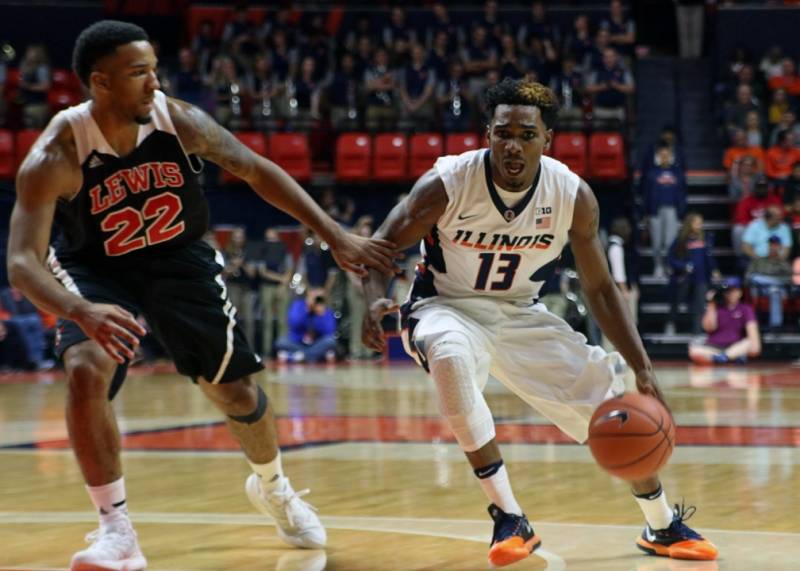
The Old Man
Tracy Abrams, point guard, redshirt senior
Poor Tracy has been Illinois’s version of the Saturday Night Live sketch “Mr. Bill.” For two consecutive summers he’s been dealt a season-ending injury before he could even step onto the court competitively. It’s been painful for Illini fans to watch such a nice and talented young man wear his church clothes to games rather than a uniform, particularly when his replacements have been mid-major replacement level rather than Big Ten-caliber point guards.
But whatever Old Testament punishment Abrams has been going through seems to have passed (for his sake, please let it be done), and Abrams is finally ready to return to the floor as Illinois’s playmaker. Last time out, in 2013-14 (!), the 6’2” Mount Carmel native averaged 30 minutes, 10.7 points, and 3.2 assists per game. Abrams never was Player of the Year material, but he was always a solid scorer and distributor, which Illinois has sorely lacked at point guard since.
Two years on the sidelines likely means some rust from Abrams early on, but it also means he’s a grown-ass man out there playing against boys. For example, Tracy will turn 25 before Illinois concludes its season, whereas teammate and fellow point guard Te’Jon Lucas just turned 18 before the season began. Illinois will be truly dependent on the wisdom Abrams has gained in his time in college hoops as well as his ability to run the offense. Abrams has to be the driving engine of the team, which means success will come from smart play (fewer poor shots, as was his wont) and an ability to draw defenders and open up lanes for others.
Groce says: “Tracy is like an extension of me, he understands what we want.”
Tracy says: “I’m always confident,” when asked how his added strength and conditioning has helped his game.
The Big
Mike Thorne, Jr., center, redshirt senior
For all the chicanery of the NCAA, you have to give the review board credit for giving Mike Thorne a sixth year of eligibility. After injuring his meniscus in the middle of last season, Thorne looked set to come back and help Illinois through the conference season, but he made it only halfway through a game at Indiana before sitting out the rest of the season. In other situations, simply coming back would have disqualified Thorne from further eligibility, but Thorne has diabetes, which makes his recovery from injury more difficult than the average person. Thankfully, that old underdog, common sense, prevailed and Thorne is able to return to the post for Illinois this year.
When Thorne left Charlotte, he was courted by the likes of Kansas and Kentucky. This is an important point to consider, because those are very, very good basketball schools. And, like Abrams, Thorne is many years older than opposing centers, adding an X-factor to his game. A full season of Thorne and his big body in the paint for Illinois could mean the difference between March Madness or a mad fanbase in March. I’m very much looking forward to seeing him square off with the Big Ten’s other big men this winter. Health is Thorne’s big issue though, and if he can’t stay healthy it could be a big hit to the Illini…again.
Groce says: “He still weighs 280-290, but he’s gone from 17% to under 10% body fat.”
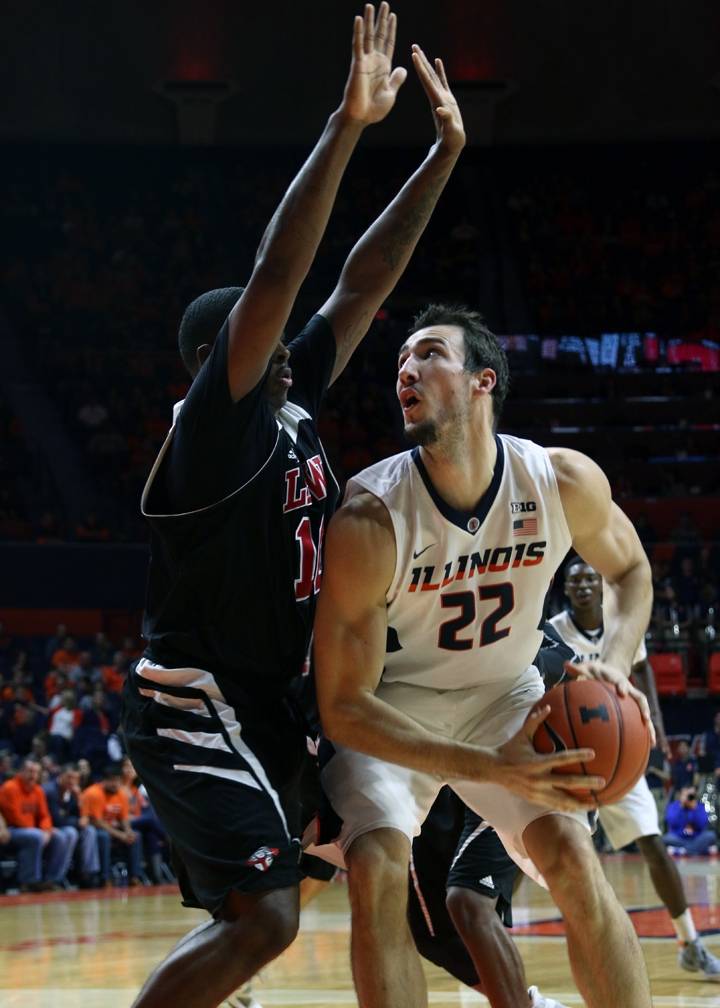
The Oddball
Maverick Morgan, center, senior
An aptronym is a name that peculiarly suits its owner, and there is no better example of an aptronym on the Illinois roster than Maverick Morgan. A maverick is unorthodox or independent-minded person, and from what we know about Mav as a person and a player, well, the title fits.
In his first couple seasons, the big man from Ohio looked like he didn’t fit into his body. He was anything but an average Big Ten post player, committing nearly as many fouls (78) as points scored (131) and rebounds grabbed (91). Then, a funny thing happened last year. With injuries to Thorne and Black, Morgan was all Illinois had to turn to at center and, yet, he wasn’t the major liability people expected. In 2015-16 he played almost three times as many minutes as he had in previous years, but saw his scoring and rebounding increase by 3.5 and 2.45 fold, respectively.
Much of Morgan’s improvement was attributed to his work with Fletcher, and it is hard to dispute both the numerical advantage and visual change evident in Morgan. This year Morgan represents much-needed depth for Illinois and an legitimate Big Ten-quality post player. Not something fans might have expected before last year. A solid Morgan in tandem with Illinois’s other bigs would make for the strongest frontcourt the team has seen in many, many years.
Groce says: “Better defensive rebounding, that’s my expectation.”
The One-Trick Pony
Jaylon Tate, point guard, senior
As he enters his senior season, we know for certain what Jaylon Tate is: a pass-first point guard with a poor shot. This was evident when he began his Illini career and more obvious as defenders began to give him acres of space, knowing he posed little threat when shooting the ball. He attempted a measly 49 shots in 524 minutes last year (or 0.09 per minute) and made just 18 of those (36%, third lowest on the team, ahead of only Jordan and walk-on Alex Austin).
Unless John Groce follows an unlikely historical precedent with Tate (detailed here), the senior is the second option at point after Abrams. However, he’s only the second option by dint of seniority; should freshman Te’Jon Lucas play well, he could quickly overtake Tate’s minutes. If Tate maintains his ball-handling and distribution skills while occasionally flashing a good shot, however, he’ll keep on as a regular option for the Illini.
Groce says: “I don’t know if we’ll play point guard by committee or how it will be. Guys have to earn it.”
Jay says: “We’re pushing each other, trying to get better every day.”
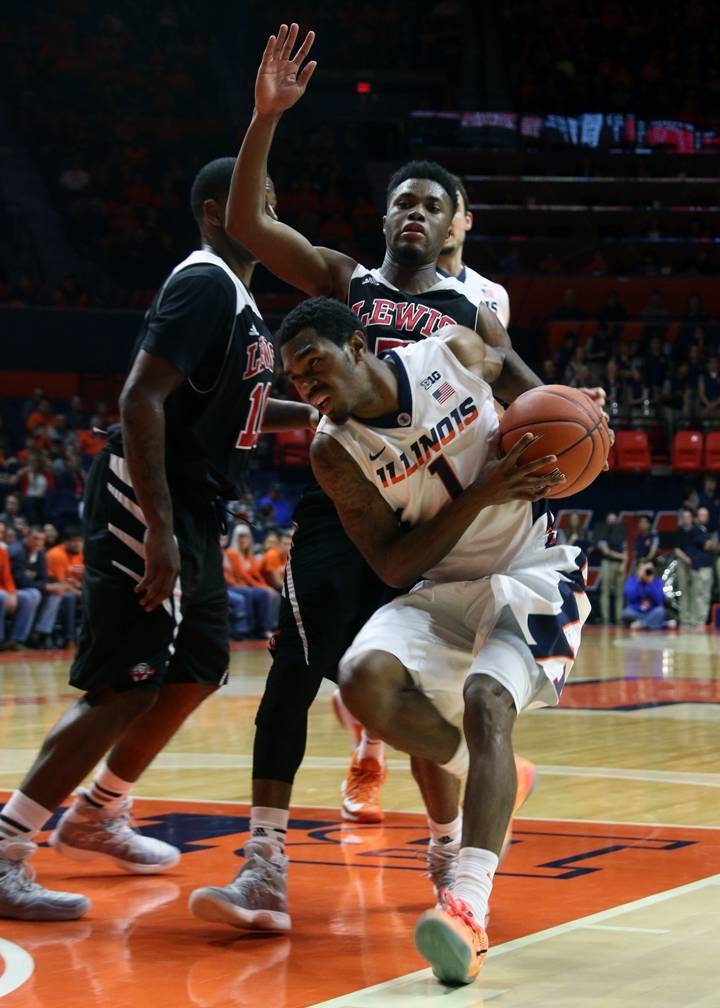
The Townie
Michael Finke, forward, redshirt sophomore
When Michael Finke matriculated from Centennial High School to the University of Illinois he was big. Then he grew before the start of his redshirt year. He added bulk while he sat, and then he grew stronger just by playing. Now, after standing next to Finke at media day, I can say without hyperbole the young man is truly huge. His gains in the weight room make him a legit Big Ten interior player and he’s going to push his teammates hard for minutes this year.
What makes him more of a threat than his size, though, is his shooting. Finke has excellent range (36% three-point shooting) and will pull defenders all around the floor. He’s going to be a true stretch player this year, getting looks inside and out, moving from the high to low post, and playing a pivotal role in the high-screen offense Illinois uses. His body and his potential as a shooter and defender are pretty impressive, which could make his sophomore season a big stepping stone.
Finke says: “We haven’t developed our roles…but we have 16 great players who can go out there whenever their number is called.”
The Reclamation
Leron Black, forward, redshirt sophomore
First things first, Leron Black is not a thug or whatever racially charged name you’d like to append to him. Yes, he is guilty of pulling a knife on someone in a heated moment, which is unacceptable and, no, that is not easily forgotten. Black, however, is doing his best to move past that (don’t believe me, read this) and he deserves the same chance at redemption that you would expect had it been your brother or cousin or friend in his situation.
Whether or not your questions over Black’s integrity linger, there is no questioning his potential. In his freshman year and in limited time before injury last year, Black showed glimpses of being a difference maker in the post, an area Illinois where is constantly in need of playmakers. He’s going to be a rebounding monster for Illinois, but he has to be able to do it without fouling; the biggest test of his growth will be whether he can limit his fouls. He’ll miss the first four games, suspended for his transgressions, but when he hits the floor I expect he’ll wreak havoc upon opponents in short order.
Groce says: “He’s more appreciative, grateful, and understands this is a privilege…. He plays like you’re holding his head underwater.”
The Sharp-Shooter
Jalen Coleman-Lands, guard, sophomore
Setting a school record for threes by a freshman was a good start, but the Indianapolis native isn’t stopping there. Despite injuring his shooting hand this summer, Jalen Coleman-Lands, known affectionately as J. Cole by coaches and teammates, is likely Illinois’s best shooter, and he’s plenty confident he will continue in that role when he gets back to playing.
When JCL got hurt, it was expected that he might not be back to practice until the week of the first game. Now, he’s on the court, albeit still somewhat limited. But he’ll be full strength very soon, and this is a remarkably positive development, because before he added strength in his first full offseason with Illinois JCL was a stud.
With Kendrick Nunn’s departure, Illinois is in need of a player who can shoot the lights out. Coleman-Lands has the potential to be that player, the potential to set his feet quickly and drop a three before his opponent can think about contesting it, the potential to hurt opponents. Potential and execution are two separate things, however, and where JCL winds up on that continuum is undetermined.
JCL says: “I’ve been shooting for a while, [the injury] won’t slow me down. It’s just like riding a bike.”
The Up-and-Down
Aaron Jordan, sophomore, guard
Consistency is probably the biggest issue when it comes to Aaron Jordan. Injuries forced him into a bigger role as a freshman than he might have gotten otherwise, but in 11 minutes per game he averaged just 3.3 points and 0.9 rebounds. As the season went on, Groce’s trust in Jordan seemed to wane, as well. In the first 10 games he averaged 16 minutes on the court, whereas in the final 20 he averaged 9; considering the competition this isn’t a huge discrepancy, but against teammate D.J. Williams (who averaged 8 and 11 minutes over the same respective spans) the difference is a little more damning.
After an offseason competing against European competition, Jordan seems to have the confidence of his coach back (he started both exhibition games). Groce is fond of saying “players play players,” which means everyone earns their own playing time. Right now, there’s something Jordan is doing to get the upperhand. It’s an open question whether or not he can maintain his position as a trusted wing option or if he’ll retreat to the back of the bench like last year.
Groce says: “Last year, some guys weren’t ready and we didn’t have depth. They understand more no and our dynamic is better.”
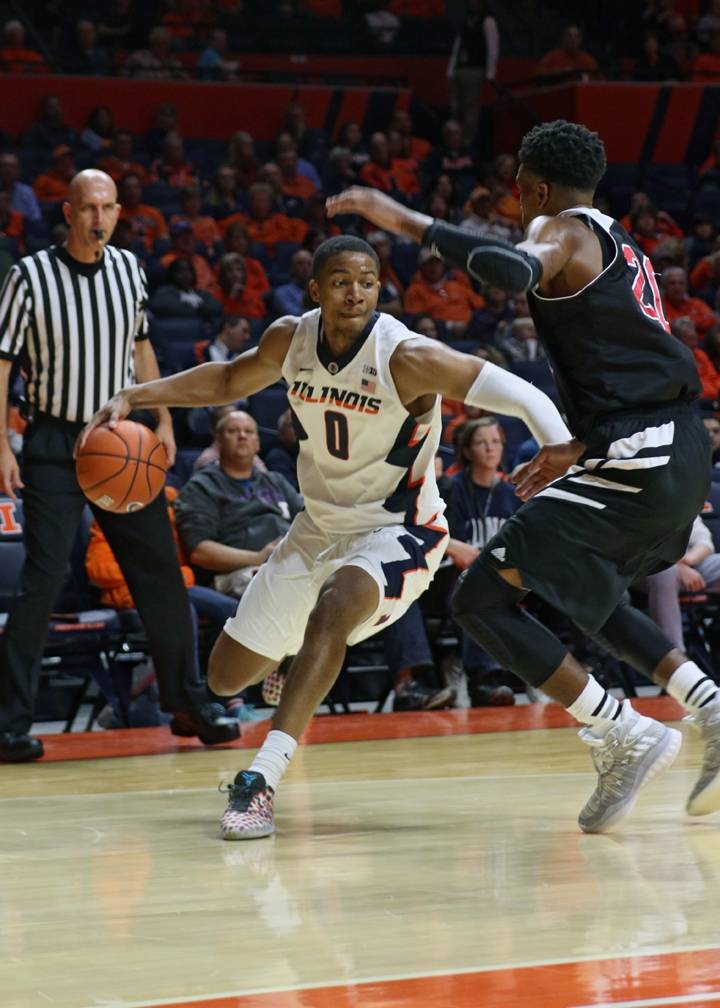
The Up-and-Comer
DJ Williams, guard, sophomore
Since last season, DJ Williams has cut his hair. The new ‘do is close cropped and makes the young Simeon product look more than a little bit like his teammate, Malcolm Hill. When asked about it, Williams laughed, said he gets similar comments from teammates and doesn’t mind. To be sure, no one will mind if Williams looks like Hill as a player, either.
Williams has the ability to come into the game and provide a jolt of electricity by slashing toward the basket or using his long wingspan to pester opponents. Yet, he’s been behind Jordan again in the preseason. He has to show improvement on defense, as does the whole team, but there must be something else keeping him back right now. Last year he vaulted to nearly be the team’s sixth man. That’s a taller task this year (assuming everyone remains healthy), but I like Williams as a player and can imagine him making that push again this season.
DJ says: “Whatever coach wants me to do, I’ll do it. If it takes me just to rebound, I’ll do it, if it’s just clap on the bench and encourage my teammates, I’ll do it.”
The Rookie
Te’Jon Lucas, point guard, freshman
John Groce came to Illinois with a renown for being a point guard’s coach, the kind of guy who can draw up a system for a talented point guard and make it work well. Since his hiring, however, he’s recruited just one point guard: Te’Jon Lucas.
It’s way too much to expect the four-star recruit from Milwaukee to come in and have an oversized impact on the Illini (especially after fracturing his ankle in two places last fall). However, it’s not too much to think that Lucas will play and play meaningful minutes this year. Lucas is known for excellent vision on the court, considered one of the best passers in his class in that regard, and has good, if not great, shooting. His game is still developing, but given the fact he stands to be the only returning point guard in 2017-18, expect Lucas to see that development happen on the court.
Te’Jon says: “We gotta battle every day in practice for playing time. We gotta make each other better. If there’s only one point guard who’s going to make him better? Nobody.”
The Mystery
Kipper Nichols, guard, redshirt freshman
Nichols has been kicking it around the team for nearly a year now, but won’t see his first game action until December thanks to the gloriously brilliant decision-makers in Indianapolis who ruled him ineligible based on one of their Kafkaesque rules for transfers (sorry for that barely veiled screed, I can’t pretend the NCAA is anything but the greatest long con in sports). So, the only things fans know about Nichols right now is that he’s really filling out his polos on the bench well.
What we do know about Nichols is that his last competitive basketball game came in March 2015. Barring injury, his next competitive basketball game will be Dec. 17 in Chicago against BYU. Over the summer, strength and conditioning coach Adam Fletcher listed him as improving his bench press 65 lbs, squat 154 lbs, and vertical leap 5 inches. According to Malcolm Hill, he’s got a good mid-range game and likes to post up. According to Mike Thorne, he’s the funniest guy on the team. He’s got an unbelievable work ethic, by Michael Finke’s estimation, and, universally, his defense is praised as his best skill.
But, until fans see him on the floor for Illinois, Kipper remains a mystery. His attitude is incredible, though, and if he can live up to his teammate’s hype, he’ll be one to watch.
Kip says: “The coaching staff, in practice they correct me and teach me a lot…between the seniors and the coaches, they provide me with a lot of guidance and keep me going.”
